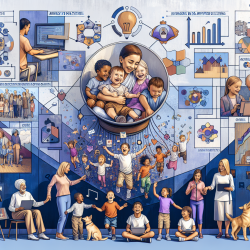Introduction
The COVID-19 pandemic has reshaped the educational landscape, presenting unique challenges for teachers striving to address the social-emotional needs of their students. As educators return to classrooms, they carry the weight of unprecedented stressors, impacting their self-efficacy and ability to support students effectively. The research article, "Understanding Teacher Self-Efficacy to Address Students’ Social-Emotional Needs in the COVID-19 Pandemic," offers valuable insights into enhancing teacher self-efficacy and fostering resilience in educational settings.
The Importance of Teacher Self-Efficacy
Teacher self-efficacy is a critical factor in creating supportive and nurturing learning environments. It encompasses educators' beliefs in their ability to manage classroom behaviors, provide emotional support, and adapt to change. High self-efficacy not only benefits teachers' mental health but also enhances student learning outcomes. The study highlights that Black teachers reported higher self-efficacy in addressing students' needs compared to their White counterparts, emphasizing the role of racial congruence in fostering confidence.
Key Findings and Implications
The research identifies several factors influencing teacher self-efficacy:
- Mental Health Support: Teachers identified the need for mental health resources for both students and themselves. Schools should prioritize hiring mental health professionals to support the transition back to in-person learning.
- Professional Development: Ongoing training is essential to equip teachers with strategies to address the unique challenges posed by the pandemic. Training should be culturally relevant and tailored to the demographics of the student population.
- In-Class Resources: Access to resources such as technology, PPE, and informational materials can empower teachers to create safe and effective learning environments.
Interestingly, the study reveals that Black teachers are more likely to feel confident in supporting their students, possibly due to a deeper understanding of their cultural context. This underscores the importance of culturally sustaining pedagogies in enhancing teacher self-efficacy.
Strategies for Practitioners
To enhance self-efficacy and support students' social-emotional needs, educators can consider the following strategies:
- Engage in Professional Development: Seek out training opportunities that focus on social-emotional learning, trauma-informed practices, and cultural competence.
- Collaborate with Peers: Build a support network with fellow educators to share experiences, resources, and strategies for managing classroom challenges.
- Advocate for Resources: Work with school administrators to secure necessary resources, such as mental health professionals and in-class materials, to support both teachers and students.
Conclusion
As schools navigate the ongoing challenges of the pandemic, fostering teacher self-efficacy is crucial for creating resilient educational environments. By prioritizing mental health support, professional development, and access to resources, educators can enhance their ability to meet the social-emotional needs of their students. To explore the full research findings, read the original research paper: Understanding Teacher Self-Efficacy to Address Students’ Social-Emotional Needs in the COVID-19 Pandemic.










